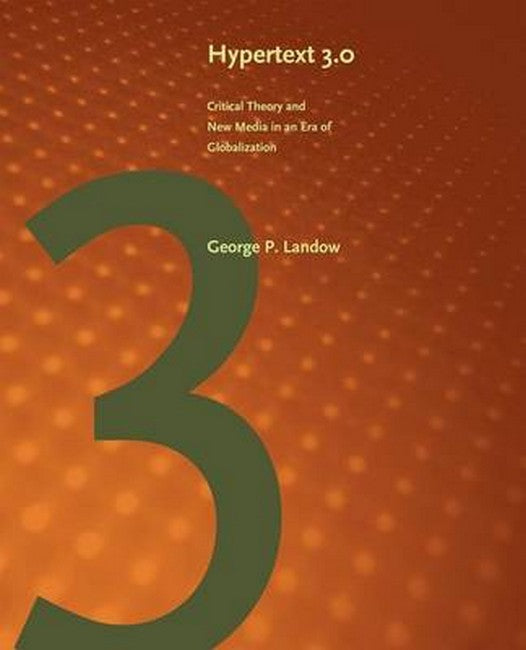Preface: Why Hypertext 3.0?Acknowledgments1. Hypertext: An IntroductionHypertextual Derrida, Poststructuralist Nelson?The Definition of Hypertext and Its History as a ConceptVery Active ReadersVannevar Bush and the MemexForms of Linking, Their Uses and LimitationsLinking in Open Hypermedia Systems: Vannevar Bush Walks the WebHypertext without Links?The Place of Hypertext in the History of Information TechnologyInteractive or Ergodic?Baudrillard, Binarity, and the DigitalBooks Are Technology, TooAnalogues to the Gutenberg Revolution2. Hypertext and Critical TheoryTextual OpennessHypertext and IntertextualityHypertext and MultivocalityHypertext and DecenteringHypertext as RhizomeThe Nonlinear Model of the Network in Current Critical TheoryCause or Convergence, Influence or Confluence?3. Reconfiguring the TextReconfiguring the TextThe In MemoriamWebNew Forms of Discursive Prose'Academic Writing and WeblogsProblems with Terminology: What Is the Object We Read, and What Is a Text in Hypertext?Visual Elements in Print TextAnimated TextStretchtextThe Dispersed TextHypertextual Translation of Scribal CultureA Third Convergence: Hypertext and Theories of Scholarly EditingHypertext, Scholarly Annotation, and the Electronic Scholarly EditionHypertext and the Problem of Text StructureArgumentation, Organization, and RhetoricBeginnings in the Open TextEndings in the Open TextBoundaries of the Open TextThe Status of the Text, Status in the TextHypertext and Decentrality: The Philosophical Grounding4. Reconfiguring the AuthorErosion of the SelfHow the Print Author Differs from the Hypertext AuthorVirtual PresenceCollaborative Writing, Collaborative AuthorshipExamples of Collaboration in Hypertext5. Reconfiguring WritingThe Problematic Concept of DisorientationThe Concept of Disorientation in the HumanitiesThe Love of PossibilitiesThe Rhetoric and Stylistics of Writing for E-Space; or, How Should We Write Hypertext?Hypertext as Collage WritingIs This Hypertext Any Good? Or, How Do We Evaluate Quality in Hypermedia?6. Reconfiguring NarrativeApproaches to Hypertext Fiction'Some Opening RemarksHypertext and the Aristotelian Conception of PlotQuasi-Hypertextuality in Print TextsAnswering Aristotle: Hypertext and the Nonlinear PlotPrint Anticipations of Multilinear Narratives in E-SpaceNarrative Beginnings and EndingsMichael Joyce's afternoonStitching Together Narrative, Sexuality, Self: Shelley Jackson's Patchwork GirlQuibbling: A Feminist Rhizome NarrativeStoryworlds and Other Forms of Hypertext NarrativesComputer Games, Hypertext, and NarrativeDigitizing the Movies: Interactive versus Multiplied CinemaIs Hypertext Fiction Possible?7. Reconfiguring Literary EducationThreats and PromisesReconfiguring the InstructorReconfiguring the StudentLearning the Culture of a DisciplineNontraditional Students: Distant Learners and Readers outside Educational InstitutionsThe Effects of Hypermedia in Teaching and LearningReconfiguring Assignments and Methods of EvaluationA Hypertext ExerciseReconceiving Canon and CurriculumCreating the New Discursive WritingFrom Intermedia to the Web'Losses and GainsAnswered Prayers, or the Academic Politics of ResistanceWhat Chance Has Hypertext in Education?Getting the Paradigm RightThe Politics of Hypertext: Who Controls the Text? Can Hypertext Empower Anyone? Does Hypertext Have a Political Logic?The Marginalization of Technology and the Mystification of LiteratureThe Politics of Particular TechnologiesTechnology as ProsthesisThe Political Vision of Hypertext; or, the Message in the MediumHypertext and Postcolonial Literature, Criticism, and TheoryInfotech, Empires, and DecolonizationHypertext as Paradigm for PostcolonialityForms of Postcolonial AmnesiaHypertext as Paradigm inPostcolonial TheoryThe Politics of AccessWho Can Make Links, Who Decides What Is Linked?Slashdot: The Reader as Writer and Editor in a Multiuser WeblogPornography, Gambling, and Law on the Internet'Vulnerability and Invulnerability in E-SpaceAccess to the Text and the Author's Right (Copyright)Is the Hypertextual World of the Internet Anarchy or Big Brother's Realm?NotesBibliographyIndex
Request Academic Copy
Please copy the ISBN for submitting review copy form
Description
""Challenges the reader... Because it invites (and nearly requires) readers to place themselves in more than one position: as a student of communication theory, as a student of computer science, as a student of academic publishing, or as a student of literature.""

